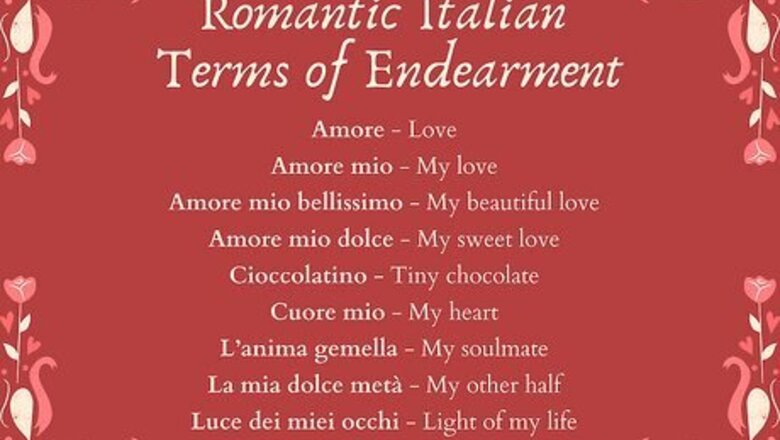
views
Romantic Italian Terms of Endearment
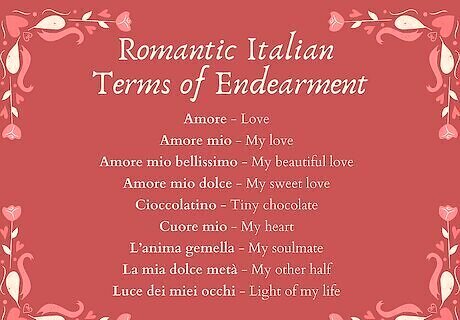
These nicknames are totally gender-neutral (or have the masculine and feminine forms listed), so you can use them around anyone with whom you share a romantic connection! Whether it’s a partner or spouse, melt their heart with the following terms of endearment (and, optionally, learn how to say “I love you,” too): Amore (ah-mor-ay) - Love Amore mio (ah-mor-ay mee-oh) - My love Amore mio bellissimo (ah-more-ay mee-oh bel-ee-see-mo) - My beautiful love Amore mio dolce (ah-more-ay mee-oh dol-che) - My sweet love Cioccolatino (cho-co-lah-tee-no) - Tiny chocolate (sugar boots) Cuore mio (kwo-reh mee-oh) - My heart L’anima gemella (la-nee-ma je-mell-ah) - My soulmate La mia dolce metà (dole-chay meh-tah) - My other half Luce dei miei occhi (loo-che day mee-ay ok-key) - Light of my life Mio sole (Mee-oh so-leh) - My sun Raggio di sole (ra-joe dee so-leh) - Ray of sunshine Splendore (splen-doe-ray) - My splendor Tesoro mio (teh-so-roe mee-oh) - My treasure Trottolino/trottolina (tro-toe-lee-no/nah) - Spinning top (little buttercup) Vita mia (vee-tah mee-ah) - My life
Italian Terms of Endearment for a Boyfriend or Husband
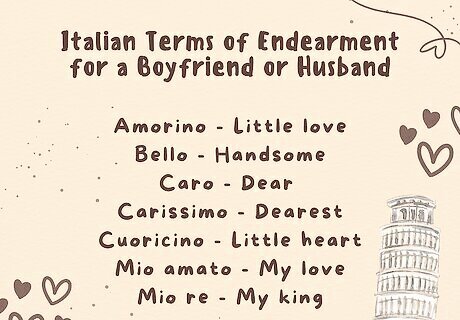
Now, let’s cover some more gender-specific terms. If you have a boyfriend, a male (or masculine) fiance, or a husband, these romantic Italian nicknames can help you show him how much you care. Amorino (ah-mor-ee-no) - Little love Bello (beh-low) - Handsome Caro (kah-roe) - Dear (can also mean “expensive”) Carissimo (ka-ree-see-mo) - Dearest (can also describe something expensive) Cuoricino (kwo-ree-chee-no) - Little heart Mio amato (mee-oh ah-mah-toe) - My love Mio re (mee-oh reh) - My king Mostriciattolo (mos-tree-cha-toe-low) - Little monster Principe (prin-chee-peh) - Prince Sposo (spo-so) - Groom Tesoruccio (te-so-roo-cho) - Little treasure
Italian Terms of Endearment for a Girlfriend or Wife
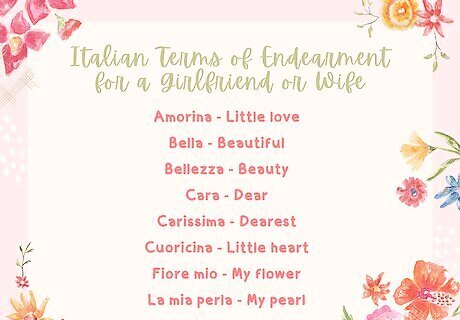
Some of these terms are simply the feminine versions of matching nicknames above; others are uniquely used around feminine people! When you want to make the girlfriend, fiancee, or wife in your life smile, try out one of these romantic Italian nicknames: Amorina (ah-mo-ree-na) - Little love Bella (beh-lah) - Beautiful Bellezza (beh-letz-zah) - Beauty Cara (ka-rah) - Dear Carissima (ka-ree-see-mah) - Dearest Cuoricina (kwo-ree-chee-na) - Little heart Fiore mio (fyo-reh mee-oh) - My flower La mia perla (lah mee-ah per-lah) - My pearl Mia amata (mee-ah ah-mah-tah) - My love Mia regina (mee-ah re-jee-nah) - My queen Mostriciattola (mos-tree-cha-toe-lah) - Little monster Principessa (preen-chee-pass-ah) - Princess Sposa (spo-sah) - Bride Stella (ste-lah) - Star Tesoruccia (tes-oh-roo-cha) - Little treasure
Italian Terms of Endearment for Family Members
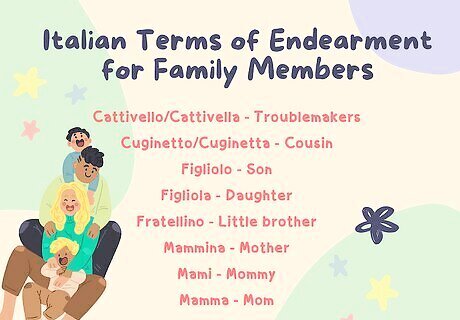
Terms of endearment aren’t just romantic—you can use adorable nicknames for just about everyone in your life, including family members. From mom and dad to daughters, sons, grandparents, and extended family, here are some cute Italian terms of endearment for family: Cattivello/Cattivella (ke-tee-vell-oh/ah) - Troublemakers (masculine/feminine) Cuginetto/Cuginetta (coo-gee-net-toe/tah) - Cousin (masculine/feminine) Figliolo (fee-glee-oh-loh) - Son Figliola (fee-glee-oh-la) - Daughter Fratellino (fra-tell-ee-no) - Little brother Mammina (mah-mee-nah) - Mother Mami (mah-mee) - Mommy Mamma (mah-mah) - Mom Nipotino (nih-po-tee-no) - Grandson, nephew Nipotina (nih-po-tee-na) - Granddaughter, niece Nonnino (no-nee-no) - Grandfather Nonnina (no-nee-nah) - Grandmother Papino (pah-pee-no) - Father Papi (pah-pee) - Dad Paparino (pah-pah-ree-no) - Daddy Sorellina (sor-rell-ee-nah) - Little sister Zietto (zee-ett-oh) - Uncle Zietta (zee-ett-ah) - Aunt
Italian Terms of Endearment for Babies & Children
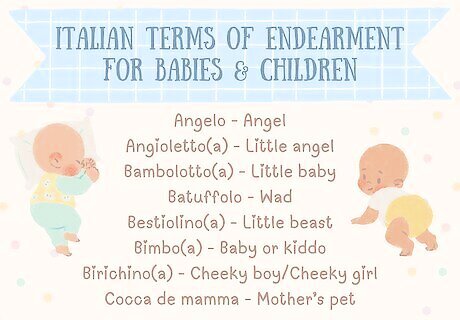
Need an Italian term of endearment for a daughter or son? These adorable nicknames are perfect for any babies or kids in your life—and since plenty of people count their pets as “children,” you can use most of these for pets, too. Note: if there’s an “a” in parenthesis, that just means there’s a feminine version of the nickname that uses an “a” at the end instead of an “o” (so, for example, “Bambolotta” instead of “Bambolotto”). Angelo (an-je-lo) - Angel Angioletto(a) (an-jo-leh-toe/tah) - Little angel Bambolotto(a) (bam-bo-lot-toe/ta) - Little baby Batuffolo (bah-too-fo-lo) - Wad (used like “pumpkin” or “dumpling”) Bestiolino(a) (beh-styo-lee-no/nah) - Little beast Bimbo(a) (beem-bo/bah) - Baby or kiddo Birichino(a) (bee-ree-chi-no/nah) - Cheeky boy/Cheeky girl Cocca de mamma (co-ka dee mah-mah) - Mother’s pet (or “Apple of mom’s eye”) Cocca di papà (co-ka dee pah-pah) - Father’s pet (or “Apple of dad’s eye”) Coccinella (ko-kee-nell-ah) - Ladybug Cucciolo(a) (coo-cho-low/lah) - Little cub, pup, or puppy Dolcezza (dole-che-tza) - Sweetnesss Farfallina (far-fa-lee-nah) - Little butterfly Fatina (fah-tee-nah) - Fairy Fiorellino(a) (fyor-eh-lee-no) - Little flower La mia gioia (la mee-ah joy-ah) - My joy Monello(a) (moe-neh-lo/lah) - Rascal Piccolo(a) (pee-ko-lo/lah) - Little one Piccolino(a) (pee-ko-lee-no/nah) - Very little one Piccolo re (pee-ko-lo reh) - Little king Pippi (peep-ee) - Sweet thing Puffo (poo-foh) - Smurf (affectionate) Pupo(a) (poo-poe/pah) - Baby Reginetta (re-jee-net-tah) - Little queen Scricciolo (skree-cho-low) - Little shrimp Tesorino (te-so-ree-no) - Little treasure
Italian Terms of Endearment for Friends
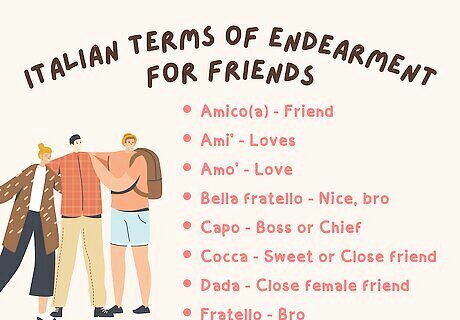
The Italian language has translations for slang words used to address friends in English—like “dude” or “sis.” In this list, you’ll find casual slang terms to use around your good friends, in addition to terms that address entire groups of friends! And, if you’re still curious about Italian slang afterward, check out our comprehensive guide. Amico(a) (ah-mee-ko/ka) - Friend Ami’ (ah-me) - Loves (for a group of close friends) Amo’ (ah-mo) - Love (for close friends or partners) Bella fratello (bel-lah fra-tell-oh) - Nice, bro (or Cool, bro) Capo (ka-poe) - Boss or Chief Cocca (caw-ka) - Sweet or Close friend (feminine) Dada (da-da) - Close female friend Fratello (fra-tell-oh) - Bro Gnocco(a) (nyok-ko/ka) - An attractive person Raga’ (rah-ga) - Guys (for groups of friends) Sorella (so-rell-ah) - Sis Vecchio(a) (vek-kyo/kya) - Old friend Zio(a) (zee-oh/ah) - Dude or Dudette
Funny Italian Terms of Endearment
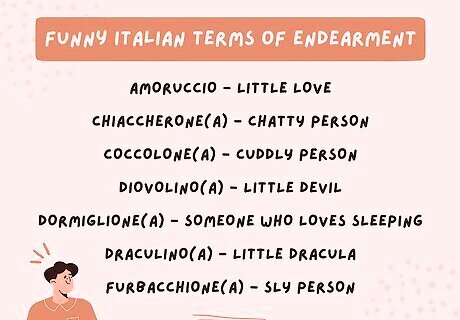
Some Italian terms of endearment are intentionally a little goofy, but make no mistake; in Italy, calling someone a “little flea” is supposed to be affectionate! Just make sure you use these around people you’re very close to—they’re not meant for strangers or formal situations. Amoruccio (ah-mo-roo-cho) - Little love Chiaccherone(a) (kya-kye-roe-neh/nah) - Chatty person Coccolone(a) (coc-co-low-ne/nah) - Cuddly person Diovolino(a) (dya-voh-lee-no/nah) - Little devil Dormiglione(a) (dor-me-lyo-neh/nah) - Someone who loves sleeping Draculino(a) (dra-coo-lee-no/nah) - Little dracula Furbacchione(a) (foor-back-yo-ne/nah) - Sly person Lumacone (loo-mah-coe-neh) - Slowpoke Mammone (mah-moe-neh) - Mamma’s boy Peluche (pe-loosh) - Stuffed animal Pinocchio (pee-knock-yo) - Someone who lies Pulce (pool-che) - Flea Pulcino(a) (pool-chee-no/nah) - Little flea Pupetto(a) (poo-pet-toe/tah) - Puppet Puzzone (pootz-oh-neh) - Stinker Tontolino(a) (ton-toe-tee-no/nah) - Foolish
Food-Inspired Italian Terms of Endearment
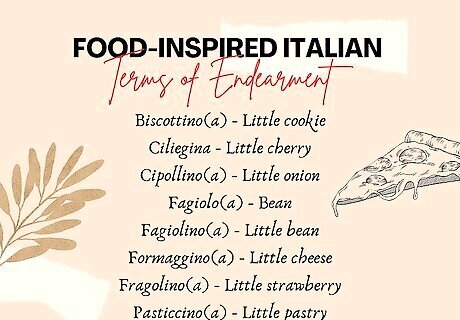
There are plenty of food-related terms of endearment in English—so it stands to reason that there’d be plenty in Italian, too. Whether your loved one reminds you more of a sweet cherry (ciliegina) or savory meatball (polpetto), there’s a food-inspired nickname here for everyone! Biscottino(a) (bees-ko-tee-no/nah) - Little cookie Ciliegina (chil-ee-gee-na) - Little cherry Cipollino(a) (chi-po-lee-no/nah) - Little onion Fagiolo(a) (fa-joe-lo/lah) - Bean Fagiolino(a) (fa-jo-lee-no/nah) - Little bean Formaggino(a) (four-ma-gee-no/nah) - Little cheese Fragolino(a) (fra-go-lee-no/nah) - Little strawberry Pasticcino(a) (pa-stee-chee-no/nah) - Little pastry Patatino(a) (pah-tah-tee-no/nah) - Little potato Polpetto(a) (pol-pet-toe/tah) - Meatball Polpettino(a) (pol-pet-tee-no/nah) - Little meatball Zuccherino(a) (zoo-ke-ree-no/nah) - Little sweetness
Animal-Inspired Italian Terms of Endearment
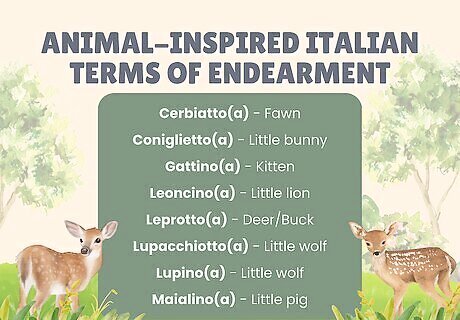
Some nicknames reference tasty treats, and others refer to adorable animals! These animal-inspired Italian nicknames can work for kids, friends, pets, and partners—they’re super flexible (and affectionate). Cerbiatto(a) (cher-byat-toe/ta) - Fawn Coniglietto(a) (co-neel-yet-toe/ta) - Little bunny Gattino(a) (ga-tee-no/na) - Kitten Leoncino(a) (le-on-chee-no/na) - Little lion Leprotto(a) (le-prot-toe/tah) - Deer/Buck Lupacchiotto(a) (loo-pah-kyot-oh/ah) - Little wolf Lupino(a) (loo-pee-no/na) - Little wolf Maialino(a) (my-al-ee-no/na) - Little pig Micetto(a) (me-chet-toe/tah) - Kitten Micio(a) (me-cho/cha) - Kitten Micino(a) (me-chee-no/na) - Kitten Orsacchiotto(a) (or-se-kyot-toe/tah) - Big bear Orsetto(a) (or-set-toe/tah) - Little bear Passerotto(a) Pesciolino(a) (pesh-oh-lee-no/nah) - Little fish Pulcino(a) (pool-chee-no/na) - Chick Scimmietto(a) (sheem-yet-toe/tah) - Little monkey Tartaruga (tar-tar-oo-gah) - Turtle (or Slowpoke) Tigrotto(a) (tee-grot-toe/ta) - Little tiger Topo(a) (toe-po/pa) - Mouse Topino(a) (toe-pee-no/na) - Little mouse
More About Italian Nicknames
Italian nicknames often use diminutive endings. Diminutives are words (or suffixes) that emphasize smallness—so it’s no surprise they’re popular in nicknames! When you use the diminutive form of an Italian word, you don’t have to use “piccolo” (little) before every name. Diminutive nicknames also tend to sound quite adorable when sounded out. Diminutive suffixes include: -ino, -ina, -ini, and -ine Ex: Amore means “love,” and Amorino means “little love.” -etto, -etta, -etti, and -ette Ex: Cugina means “cousin,” and Cuginetta means “little cousin.” -ello, -ella, -elli, -ette Ex: Scimmia means “monkey,” and Scimmietto means “little monkey.” -uccio, -uccia, -ucci, -ucce Ex: Tesoro means “treasure,” and Tesoruccio means “little treasure.” -otto, -otta, -otti, -otte Ex: Passero means “sparrow,” and Passerotto means “little sparrow.” -acchiotto, -acchiotta, -accihotti, -accihotte Ex: Lupo means “wolf,” and Lupacchiotto means “little wolf.” -iciattolo, -iciattola, -iciattoli, -iciattole Ex: Mostricio means “monster,” and Mostriciattolo means “little monster.”
Some Italian nicknames use other augmentative endings. Augmentative suffixes can indicate when something is big or use “very” to emphasize; there are also superlative forms for certain Italian nicknames. Here, we’ll show you how augmentative suffixes can change a nickname (including some in this article): -one, -ona, -oni → “Big” Ex: Mano means hand, and Manona means “big hand.” -acchione, -acchiona, -accihoni → Derived from “-one,” usually has an ironic undertone Ex: Furbo means “cunning,” and Furbaccione means “very cunning.” -issimo, -issima, -issimi, -issime → “Most” (a superlative) Ex: Cara means “dear,” and Carissima means “dearest.”



















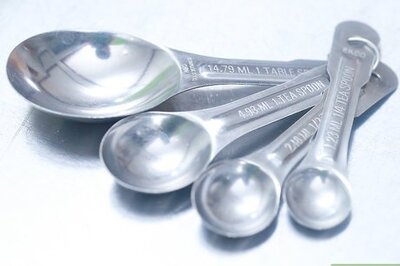
Comments
0 comment